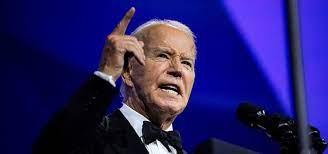
President Joe Biden has called on Congress to pass a short-term spending bill to prevent a government shutdown and keep essential services running. As the deadline for funding the federal government approaches, Biden’s appeal is aimed at avoiding political gridlock and ensuring continued financial stability.
The Need for a Short-Term Spending Bill
A short-term spending bill, also known as a continuing resolution (CR), allows the government to maintain current funding levels temporarily while lawmakers negotiate a longer-term budget plan. With the federal fiscal year ending on September 30, a CR is necessary to prevent a shutdown of federal agencies, which would affect everything from military operations to social services.
See here:
President Biden emphasized the importance of passing the bill to ensure the smooth functioning of essential government services, avoid disruptions to the economy, and provide more time for budget discussions.
Government Shutdown Risks
If Congress fails to pass the CR, a government shutdown could occur, leading to a halt in non-essential federal services. Previous shutdowns have affected hundreds of thousands of federal workers, delayed public services, and caused disruptions in various sectors of the economy.
Federal employees would be furloughed, national parks could close, and programs such as food assistance and housing vouchers could face delays. The ripple effects would extend to industries that rely on government contracts and funding, as well as the overall economy.
Ongoing Budget Negotiations
The call for a short-term spending bill comes as negotiations over the federal budget have stalled. Lawmakers in Congress are divided over several key issues, including funding for social programs, defense spending, and border security.
Some Republicans are pushing for significant spending cuts, while Democrats are advocating for maintaining or increasing funding for key social services. These divisions have delayed the process of passing a comprehensive budget, increasing the likelihood of a short-term stopgap measure.
Biden’s Plea to Lawmakers
President Biden urged Congress to prioritize the needs of the American people and avoid political brinkmanship. In his statement, Biden noted that a shutdown would harm families, workers, and businesses across the country.
“This is no time for gamesmanship or delays,” Biden said, adding that a failure to act would “undermine our economic progress and weaken our nation’s standing.”
The president emphasized that passing a short-term spending bill would not only prevent immediate disruption but would also provide Congress with more time to work on a bipartisan budget agreement that reflects the nation’s priorities.
The Economic Impact of a Shutdown
A government shutdown could have a significant economic impact, particularly as the U.S. economy continues to recover from the effects of the COVID-19 pandemic. Economists warn that even a short-term shutdown could disrupt markets, decrease consumer confidence, and slow economic growth.
Previous shutdowns have cost the U.S. economy billions of dollars in lost productivity and delayed government projects. A prolonged shutdown could potentially lead to higher borrowing costs, a weaker U.S. dollar, and financial uncertainty for businesses reliant on federal contracts.
What Happens Next?
Congress has a limited window to pass the CR before the end of the fiscal year. If lawmakers reach a consensus, the stopgap measure would temporarily fund the government and avoid a shutdown while giving Congress additional time to debate and pass a comprehensive budget.
However, failure to reach an agreement could lead to a government shutdown, with federal workers and agencies bearing the brunt of the consequences. With political divisions deepening in Washington, the coming weeks will be critical in determining the immediate future of government operations.
Conclusion
President Biden’s call for Congress to pass a short-term spending bill underscores the urgency of avoiding a government shutdown. While lawmakers continue to negotiate the broader federal budget, the immediate focus is on keeping the government funded and ensuring stability for federal workers, programs, and the economy. The outcome of these negotiations will determine whether the U.S. can avert another shutdown and continue its economic recovery without major disruptions.





